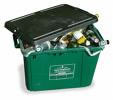"Recycling rates rocket by 30% when councils switch to alternate weekly collection”
But will councils bin London Government Association's rubbish analysis?
The first ever analysis of whether alternate week bin  collection improves recycling rates was revealed this week by the Local Government Association. The analysis shows that councils with the system in place have a recycling rate more than 30 per cent higher than those who do not.
collection improves recycling rates was revealed this week by the Local Government Association. The analysis shows that councils with the system in place have a recycling rate more than 30 per cent higher than those who do not.
The study, taken from the most recent figures on local authority recycling rates, shows that, on average, 30 per cent of household waste is recycled or composted in councils with the alternate weekly collection scheme. For councils that have opted not to undertake alternate weekly collection, an average of 23 per cent of household waste is recycled or composted.
All ten of the councils with the highest recycling rates in the country have adopted alternate weekly collection and eight out of ten of the councils with the most improved recycling rates also use alternate weekly collection.
If this recycling rate was replicated across the country, the council taxpayer would save around £22million every year in taxes on landfill and cut landfill by 1.2million tonnes.
Alternate weekly collection is when the general rubbish bin is collected one week and the recycling green bin the next. It is not when rubbish collection is done only once every fortnight as some commentators have suggested.
Chairman of the Local Government Association, a cross party organisation representing councils in England, Sandy Bruce Lockhart, said "Councils are using many different techniques to make sure that as much rubbish is recycled to help the environment and keep council tax down. It is up to each council, with their local residents, to decide which sort of approach is used to ensure that local residents help do their bit for the environment and keep council tax as low as possible.
"With landfill taxes set to rise dramatically in the coming five years, there will be more and more pressure on councils to cut the amount of rubbish that gets thrown into landfill. The National Audit Office has estimated that unless landfills rates drop dramatically in the coming years then councils, and the taxpayer will have to pay fines of £200million.
"Britain is the dustbin of Europe with more rubbish being thrown into landfill than any other country on the continent. For decades people have been used to being able to throw their rubbish away without worrying about environmental consequences or rising costs. Those days are now over.
"Councils are listening to local residents and taking action over their concerns about protecting the environment and helping tackle climate change. The move by some to alternate weekly bin collections is aimed at working with residents to reduce waste, increase recycling and slowing rising costs from EU legislation and higher landfill tax.
"There needs to be an urgent and radical overhaul of the way in which rubbish is thrown away. Local people, businesses and councils all have a vital role to play to protect our countryside before it becomes buried in a mountain of rubbish. The choice is simple and stark. Either people throw away more rubbish into their black bins and they will damage the environment or they recycle more and help save the planet."
A spokesperson for Ealing Council stated "Ealing Council has just completed the largest consultation in its history on refuse and recycling services. What we found was:
- This is an important issue to many people with almost £30,000 homes taking part over the two phase consultation - staggering response, very high for local governement consultations.
- People rejected the idea of fortnightly collections during phase 1 - it proved to be the most unpopular of all options!
We therefore discounted this option and another before asking people to make a simple choice between two options in the second phase of the consultation and can confirm that Ealing will retain weekly collections."
Hounslow Council's Natasha Epstein said, "Members are currently reviewing waste collection but there are no plans to move to fortnightly refuse collections at this stage."
April 30, 2007